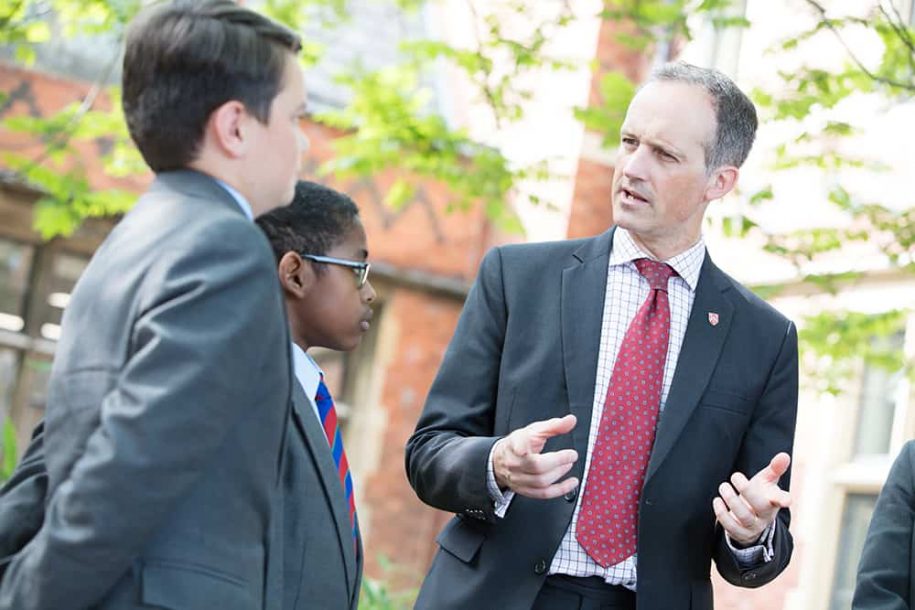Why boredom is a good thing

<strong>Why boredom is a good thing</strong>
One of the phrases we dread hearing from young children is ‘I’m bored’. From an early age in our children’s upbringing, we know that this is a prelude to fraternal dispute or our own time being demanded. However, as the Easter holiday approaches, I would argue that boredom is nothing to be afraid of. We should resist the temptation to fill every hour of our children’s lives in an attempt to provide stimulating entertainment. Children need to learn how to occupy themselves (without their electronic babysitter) as part of the process of becoming truly self-dependent.
In modern society, we have a strange relationship with boredom. On the one hand, boredom is so unpleasant that we expend considerable resources on trying to prevent it or reduce it. Entertainers, whether actors or sportsmen receive extraordinary remuneration for helping to banish our boredom; I read that the global entertainment industry is worth over $2 trillion per year. On the other hand, LGS parents and staff, with our business and parental responsibilities long for the chance to do nothing in an accelerated world. “How lovely it would be to be bored!” we might think if we hear a child complaining of having nothing to do.
You will probably have had the same conversation with your son as I have had about how you spent school holidays during your own childhood. In a pre-technological age, holidays were spent outdoors as far as possible, and when the weather was poor, we each had our go-to activities, whether traditional games, or reading, or perhaps a creative endeavour – drawing or making something. I recall spending the whole summer ordering my younger brother around, making him play the sports I wanted to play. Alternatively, as I was never an avid reader of fiction until late adolescence, I would spend hours in encyclopaedias, learning all the capitals of the world and memorising post-War FA Cup winners. (Isn’t it strange how you never forget what you learned prior to the age of 11?)
We certainly didn’t expect our own parents to entertain us throughout the school holidays, and I think we must be very wary of doing so with our own progeny. Of course, an occasional day out is a good thing, but we should make it the exception rather than the rule. I would argue that it’s actually a vital skill for children to learn how to entertain themselves. One of our biggest challenges as we grow up is learning to manage our time effectively. Therefore, surely it must be essential for children to have the chance to decide for themselves how to fill periods of unstructured time? If not, they will never become proficient in managing their priorities in the workplace and at home.
Perhaps even more importantly, unstructured time gives children the opportunity to explore their inner and outer worlds. This is how they learn how to imagine, invent and create – vital skills for the rapidly changing world of the Twenty-First Century. Unstructured time also challenges children to explore their own passions. If we keep them busy with holiday clubs and organised activities, or if they fill their time with screen entertainment, they become passive consumers of other people’s creativity. They will never learn to respond to the stirrings of their own heart, whether collecting bugs from the garden, creating an artwork, or researching an esoteric interest.
I should stress that I am largely discounting mobile devices in this discussion. While computer gaming (and similar) is fine in moderation, we should resist the temptation of it becoming the default ‘electronic babysitter’. My two sons have vastly different approaches to filling their holiday time. Despite identical upbringing, one spent the first day of the Christmas break apparently glued to YouTube videos. The other devoted the morning to designing and re-designing parachutes and testing them by launching them down the stairwell. This was followed in the afternoon by some positive technology use, filming a stop-go Lego animation with his iPad. I’m making the point that we should distinguish between the ‘good’ and ‘bad’ use of technology by our sons. By all means they should be encouraged to use technology creatively, for example, in coding, in making music, even in playing Minecraft, but we are not truly banishing boredom if they are engaging only passively with content created by others.
If we can develop our children’s ability to respond to boredom by finding ways to actively fill it, we will be doing them a huge favour in the long run. I read recently that people prone to boredom are also prone to mental health disorders such as depression, substance abuse and problem gambling. If we can help them to acquire the reflex to plan projects as an antidote to boredom, the holidays can be a time for learning and for developing their sense of achievement and wellbeing.
